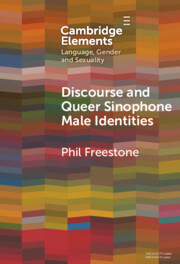Discourse and Queer Sinophone Male Identities
This Element analyses the sociolinguistic navigation of cultural and ideological influence among queer male-identified individuals in Chengdu and Taipei. Situated within the broader field of queer linguistics, it addresses what Cashman (Reference Cashman2019: 521) identifies as the ‘great need for a broader and more inclusive understanding of the diversity of LGBTQ expression and for further research in non-Anglo, non-English speaking communities’. In addition, it draws on queer Sinophone work which problematises the broad cultural schema prevalent in analysis of sexual minority lives in the region (Chiang and Heinrich, Reference Chiang and Heinrich2013; Chiang and Wong, Reference Chiang and Wong2020).Footnote1 Building on these insights, I demonstrate how not all queer individuals in Sinophone contexts navigate the same sets of ideological influences, nor in the same ways, despite the widely presumed generalisability of ‘Chinese gay’ lives, and the ostensible stability of associated cultural and sexual labels. As Martin (Reference Martin, McLelland and Mackie2014: 41) acknowledges: ‘The starting point for approaching contemporary Chinese cultures is acknowledgment of their difference, multiplicity, and fragmentation, but we should recognise, too, that new forms of shared experience are also enabled as a result of transnational flows of media and migration in a contemporary globalising world.’
